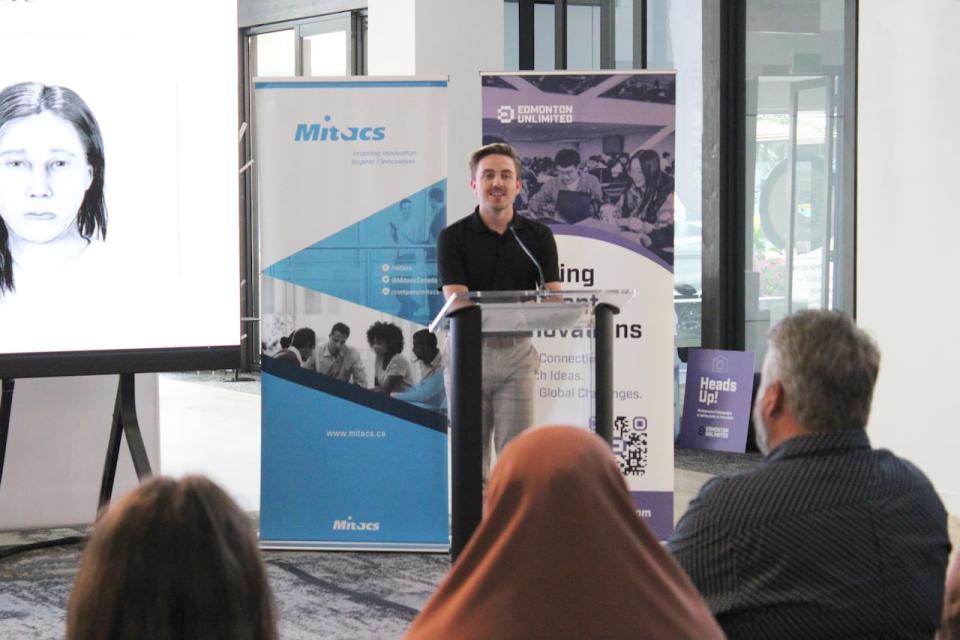A 25-year-old Edmonton entrepreneur is using genetic genealogy technology to track the DNA of unidentified victims in cold cases.
Bradley Pierson started his company Trouvay in 2022 to help people identify their families and is now expanding his work to help law enforcement services solve crimes.
“I realized there was a huge crisis of unidentified human remains and unsolved violent crime cases, and this technology had emerged that allowed us to solve them finally,” Pierson told CBC in an interview.
Toronto forensic genealogist James Atkinson said investigative genetic genealogy is a technology that uses DNA testing in combination with research methods and historical records to determine biological relationships.
He says genetic genealogy has become a growing tool for many people looking to learn more about their heritage, solve family mysteries, or connect with distant relatives.
Pierson’s journey into genetic genealogy began with a personal interest in family history.
At the age of 13, he started tracing family trees. Ten years later he realized he could help people who were adopted to find their birth parents. He made 100 identifications and realized he could use the same technology to solve cold cases.
In 2023, Pierson collaborated as a volunteer under Det. James Atkinson on an Ontario case that was being handled by the Toronto Police Service.
Known as the Deep River John Doe, the case involved a man from Drumheller, Alta., who was found dead in 2001 on a bench in the Laurentian Hills, near Deep River, Ont.
Over the summer, Pierson worked alongside Atkinson and other volunteers to identify the man using investigative genetic genealogy. Twenty years after the man died, the team was able to bring closure to his family. The man’s name was withheld from the public per his family’s request.
Volunteers like Pierson were vital to the solving of this case, Atkinson said in an interview.
Investigative genetic genealogy uses DNA testing in combination with research methods and historical records to determine biological relationships.
Atkinson said genetic genealogy has become a growing tool for many people looking to learn more about their heritage, solve family mysteries, or connect with distant relatives.
Working with Indigenous communities
Pierson relies on public DNA databases to help him find answers to questions that have remained unsolved in some cases for many years.
Some of his work is with families in Indigenous communities, in part because many lack access to DNA testing services or are leery of using them because of injustices they have experienced in the past.
He said he has learned about hundreds of unidentified people buried in Edmonton cemeteries going back as far as 1910, and that the Office of the Chief Medical Examiner has many sets of unidentified human remains.
“I look at those numbers and think, that’s a huge unknown crisis,” he said.
Early in 2023, Pierson came across two similar cases involving a missing woman.
One was Caucasian and the other was Indigenous. He was disappointed to see the Indigenous woman’s case get much less media attention than the other case.
Although Trouvay did not help with that particular case, Pierson was pleased to see that Louise Laderoute’s body was later found and identified by the Edmonton Police Service.
“When I was introduced to her story, [Laderoute] was Edmonton’s oldest outstanding missing person file,” he said. “What really fascinated me is that there was nothing out there about her, other than a short police release.”
A month later, Pierson spoke with Laderoute’s family while they were advocating for missing and murdered Indigenous women. The case ignited his passion to help others in the same situation as hers and use a victim-centred approach to solving these cases.
Trouvay is now collaborating with an Alberta Métis settlement to further the mission of advocating for increased resources in underrepresented communities.
The company is supporting the settlement through learning about DNA testing, administering DNA tests, and understanding the results of their DNA tests.
In some instances the company is helping people find their biological families, and assisting those who want to share their DNA to help finding missing and murdered Indigenous women. Pierson uploads DNA profiles to websites that law enforcement can use to make identifications.
He is currently focused on helping to identify the remains of residential school victims and missing Indigenous women.
StudentPreneur summer program
On Aug. 21, Pierson was one of 27 young entrepreneurs who got a chance to demonstrate their creativity and innovation at an Edmonton Unlimited showcase event.
It was part of the innovation agency’s StudentPreneur program, which is designed to bridge the gap between academic learning and real-world business experience for post-secondary students. Pierson is studying business management.
Jeff Shon, the lead executive in residence at Edmonton Unlimited, said the program provides financial and mentorship support to help students turn innovative business ideas into reality.

Bradley Pierson presented his project at Edmonton Unlimited’s Student Innovators Showcase. (Submitted by Amanda Sparks/Edmonton Global)
“Students are the lifeblood of any thriving innovation economy, so it is in our collective best interest to make sure that these students are supported, they have the adequate resources to build, test and learn,” Shon said.
Pierson pitched his project at the showcase event, hoping to get connected to law enforcement agencies and present his services.
Solving cases requires time and money
Pierson hopes Trouvay can be a leader in providing investigative genetic genealogy across Canada, providing answers for the public and police agencies.
Pierson’s work is not without its challenges. Cases can be stalled for decades and unsolved, as it costs law enforcement a lot of money to keep cases open.
Ashley Allen, the Indigenous entrepreneurship specialist at Edmonton Unlimited, mentored Pierson.
Allen said it can be a challenge to navigate the cost and time needed to work on unsolved cases. She praised Pierson’s commitment to collaborating with communities.
“It’s really cool to see the traction he’s getting,” she said.
“What Bradley is able to bring with Trouvay is working with Indigenous communities, where the DNA data isn’t held, and they get to have sovereignty over their information again.”

